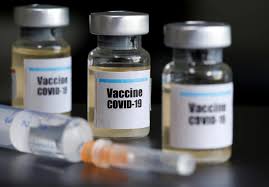Foreign News
Chile Starts Fourth Covid jab Dose as Cases Rise

Chile has started administering fourth doses of COVID-19 vaccines, the first Latin American country to do so, as the Omicron variant fuels a surge in cases.
People with weakened immune systems will be the first to receive the shots. The campaign will be extended to all those over the age of 55 in February.
Infections are rising across South America, which was badly hit by previous waves of the pandemic.
Since then, some countries have managed to achieve high levels of vaccination.
Chile has fully vaccinated more than 14 million people over the age of three, out of a population of 19 million, according to the health ministry. Around 11.3 million people have already received a third dose.
The country’s campaign started with the Chinese-made Sinovac vaccine, and the expansion of the programme to include fourth doses will use a combination of Sinovac, Pfizer and AstraZeneca jabs.
President Sebastián Piñera, who visited a Santiago hospital where fourth shots were offered on Monday, also urged people to get vaccinated, saying the jabs are “safe and work”.
He said of those refusing to be vaccinated: “What you’re doing is irresponsible. If you aren’t vaccinated, you’ll get infected, you’ll infect your families, partners [and] work colleagues.”
The highly infectious Omicron variant is behind a surge in cases around the world, though studies suggest it is less severe than other variants of the virus, especially for those who have been vaccinated. However, the high number of infections is putting pressure on health services.
Israel started offering a wide rollout of a fourth COVID-19 vaccine earlier this month, believed to be the first nation to do so.
Elsewhere in South America, Argentina, Bolivia and Peru have all reported record case counts in recent weeks.
Foreign News
CAF Sanctions Kenya Again over Crowd Trouble

The Confederation of African Football (CAF) has sanctioned African Nations Championship (CHAN) co-host, Kenya, for the second time in as many weeks over security breaches.
In a statement made available on Monday evening, the continental governing body said that it has limited entry to the 48,000-seat Moi International Sports Centre.
It also said that, known as Kasarani Stadium, can accommodate 27,000 fans for Sunday’s Group A match between Kenya and Zambia.
CAF said only electronic ticket holders would be allowed into the stadium, with thermal tickets prohibited.
The governing body warned that Kenya’s matches could be relocated from Kasarani Stadium if organisers fail to prevent further breaches.
“We trust these measures will be applied swiftly to protect competition’s integrity, ensure fan safety, and uphold confidence in Kenya’s commitment to the tournament,” CAF said.
The sanctions follow incidents on Aug. 10 when Kenya defeated two-time winner Morocco 1-0 in spite of playing the entire second half with 10 men.
The win put Kenya top of Group A with seven points.
The debutants would reach the quarterfinals with at least a draw against winless Zambia.
Last week, Kenya’s football federation was fined nearly 20,000 U.S. dollars for security lapses during the team’s 1-0 win over DR Congo in the tournament opener on Aug. 3.
In the latest case, CAF cited major lapses, including stadium gates and restricted service areas being overrun by ticketless spectators and holders of government-distributed physical tickets.
It also accused security personnel of losing control at exit points and allowing breaches of the perimeter fence that enabled thousands of ticketless fans to enter.
CAF had expressed alarm over the use of tear gas and flash grenades, reports of live ammunition fired near spectators and staff, and violent incidents such as stone-throwing at security personnel.
It also cited unsafe vehicle movement in spectator areas, inadequate police response, and the lack of medical incident reports in spite of injuries being reported.
Organisers were further criticised for insufficient communication tools and the absence of CCTV coverage at critical entry points.
Foreign News
Madonna Urges Pope Leo to Visit Gaza

Pop icon Madonna has made an appeal to Pope Leo XIV, urging him to visit the blockaded Gaza Strip amid a starvation crisis that has sparked international outrage.
“You are the only one of us that cannot be denied entry,” the U.S. singer wrote on social media platform X late on Monday.
“We need the humanitarian gates to be fully opened to save these innocent children.
“There is no more time,” she added.
Marking the 25th birthday of her son Rocco Ritchie on Monday, Madonna also announced plans to donate to humanitarian organisations working in Gaza.
“I feel the best gift I can give to him as a Mother is to ask everyone to do what they can to help save the innocent children caught in the crossfire in Gaza,” she wrote.
A United Nations (UN) agency said late last week that “acute malnutrition among children in Gaza has reached the highest levels.”
In July alone, nearly 12,000 children lower than five in age were identified as acutely malnourished, with another 2,500 found to suffer from severe acute malnutrition.
According to the UN Office for the Coordination of Humanitarian Affairs (OCHA), this is the most life-threatening form.
Israel controls access roads to Gaza and has sealed off the coastal area.
Very little aid got into Gaza from March through May, when Israel began allowing in deliveries using a controversial private system that bypasses traditional UN agencies.
Under pressure from allies, Israel recently began permitting larger convoys into the territory, as aid airdrops take place overhead.
On Sunday, Irish rock band U2 issued a stinging critique of the Israeli government’s actions.
“We know Hamas are using starvation as a weapon in the war, but now so too is Israel and I feel revulsion for the moral failure,” frontman Bono wrote.
Foreign News
Putin Bans Foreign-made Clothing for Russian Army From 2026

Russian President Vladimir Putin signed a decree on Monday banning the procurement of foreign-made clothing and related gear for the country’s armed forces starting in 2026.
According to the decree, from Jan. 1, 2026, all uniforms and other clothing items for the Russian Armed Forces must be produced by Russian companies whose manufacturing facilities are located within the country.
By 2027, the requirement would extend to fabrics and knitted materials used in production, which must be domestically manufactured.
The measure aims to entirely exclude the purchase of foreign-made clothing and materials for the needs of the military, the decree said.
Military clothing and gear include uniforms, insignia, underwear, bedding, special clothing, footwear, equipment, and sanitary items.
Such supplies are procured through the Russian state defence order system.
























